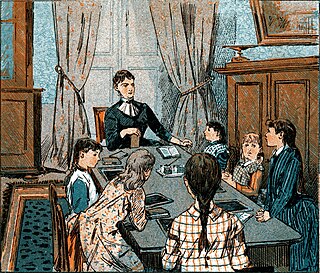
Homeschooling or home schooling, also known as home education or elective home education (EHE), is the education of school-aged children at home or a variety of places other than a school. Usually conducted by a parent, tutor, or online teacher, many homeschool families use less formal, more personalized and individualized methods of learning that are not always found in schools. The actual practice of homeschooling varies considerably. The spectrum ranges from highly structured forms based on traditional school lessons to more open, free forms such as unschooling, which is a lesson- and curriculum-free implementation of homeschooling. Some families who initially attended a school go through a deschool phase to break away from school habits and prepare for homeschooling. While "homeschooling" is the term commonly used in North America, "home education" is primarily used in Europe and many Commonwealth countries. Homeschooling should not be confused with distance education, which generally refers to the arrangement where the student is educated by and conforms to the requirements of an online school, rather than being educated independently and unrestrictedly by their parents or by themselves.
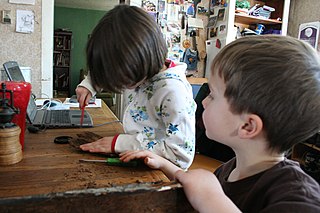
Unschooling is a belief of self-driven informal learning characterized by a lesson-free and curriculum-free implementation of homeschooling. Unschooling encourages exploration of activities initiated by the children themselves, under the belief that the more personal learning is, the more meaningful, well-understood, and therefore useful it is to the child.
Alternative education encompasses educational philosophy differing from mainstream pedagogy and evidence-based education. Such alternative learning environments may be found within state, charter, and independent schools as well as home-based learning environments. Many educational alternatives emphasize small class sizes, close relationships between students and teachers and a sense of community.
Deschooling is a term invented by Austrian philosopher Ivan Illich. Today, the word is mainly used by homeschoolers, especially unschoolers, to refer to the transition process that children and parents go through when they leave the school system in order to start homeschooling. The process is a crucial basis for homeschooling to work. It involves children gradually transitioning away from their schoolday routine and institutional mentality, redeveloping the ability to learn via self-determination, and discovering what they want to learn in their first homeschool days.

The Home School Legal Defense Association (HSLDA) is a United States-based organization that seeks to advance the freedom of parents to homeschool their children. HSLDA describes itself as a "Christian organization."
The Chalcedon Foundation is an American Christian Reconstructionist organization founded by Rousas John Rushdoony in 1965. Named for the Council of Chalcedon, it has also included theologians such as Gary North, who later founded his own organization, the Institute for Christian Economics.
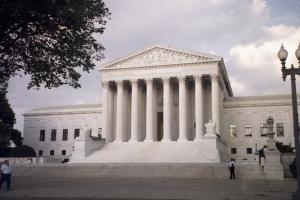
Homeschooling constitutes the education of about 3.4% of U.S. students as of 2012. The number of homeschoolers in the United States has increased significantly over the past few decades since the end of the 20th century. In the United States, the Supreme Court has ruled that parents have a fundamental right to direct the education of their children. The right to homeschool is not frequently questioned in court, but the amount of state regulation and help that can or should be expected continues to be subject to legal debate.
Generation Joshua, often called "GenJ" by its members, is an American Christian fundamentalist youth organization founded in 2003 that aims to encourage youth participation in government, civics, and politics toward conservative Christian values. GenJ is a division of the Home School Legal Defense Association, which is a non-profit 501(c)4 organization, based in Purcellville, Virginia. The organization was founded by Michael Farris and Mike Smith and is located on the campus of Patrick Henry College.
Mary Pride is an American author and magazine producer on homeschooling and topics from a theologically conservative stance within Christian fundamentalism. She is best known for her women’s roles and homeschooling publications, while she has also written on parental rights and the need to shelter children from what she has deemed "corrupting influences" from modern culture. For her role in authoring guides for the homeschooling movement, Pride has been described as "the queen of the home school movement" and as a "homeschooling guru". Stemming from her first book, The Way Home, she is also considered a primary source in the philosophy of the hyper-fundamentalist Christian Quiverfull movement.
Single-parent homeschooling is the practice of conducting homeschool by a parent who may be the sole breadwinner for the family. According to the peer-review journal Education Policy Analysis, based on the findings of the National Household Education Survey, of the National Center of Educational Statistics, between 1994 and 1999 the number of single-parent homeschools almost doubled. No further statistics are currently available. It is the general perception, by most homeschooling advocates, that most single-parent homeschools are led by a self-employed single parent, one that is receiving public assistance, or someone that has received a life insurance settlement. In some single-parent homeschool circles it is thought that most-single parent homeschools are run by parents who work full-time jobs outside the home. No statistics have been compiled to confirm or invalidate either supposition.
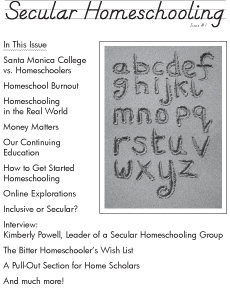
Secular Homeschooling was an American magazine for people who homeschool for reasons other than religion. It began as a quarterly, but became a bimonthly in July 2009. The magazine is no longer published and the final issue was released in 2011.
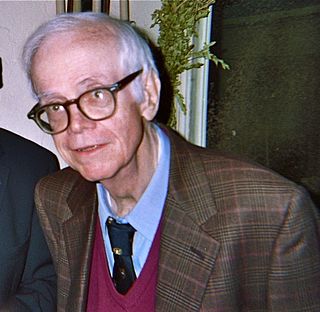
Daniel Lawrence O'Keefe was an American writer. He was an editor at Reader's Digest for more than 30 years, where he worked with a wide range of writers.
The legality of homeschooling varies in many countries. Countries with the most prevalent homeschooling movements include Australia, Canada, New Zealand, the United Kingdom, and the United States. Some countries have highly regulated homeschooling programs as an extension of the compulsory school system; others, such as Germany, have outlawed it entirely. In some other countries, while not restricted by law, homeschooling is not socially acceptable, or is considered undesirable, and is virtually non-existent.
Homeschooling in New Zealand is legal. The Ministry of Education reports annually on the population, age, ethnicity, and turnover of students being educated at home.

Homeschooling in South Africa had been illegal, until it was recognized in 1996 under the South African School Legislation, since then it has grown significantly.
Mark O'Keefe is an American screenwriter, who specializes in the comedy genre. He wrote and produced the 2003 film Bruce Almighty, starring Jim Carrey, and the 2006 film Click, starring Adam Sandler. O'Keefe resides in Los Angeles.
Elizabeth Bartholet is the Morris Wasserstein Public Interest Professor of Law at Harvard Law School, and Faculty Director of Harvard Law School's Child Advocacy Program (CAP). She teaches civil rights and family law, specializing in child welfare, adoption and reproductive technology.
In Canada, homeschooling has increased in popularity since the advent of the 21st century. It is legal in every province, with each province having its own regulations around the practice. In some provinces, funding is available. In 2016, the number of homeschooled children in Canada was approximately 60,000 ; this corresponds to approximately one in every 127 school-aged children. In 2020, the average growth rate of the practice amounted to more than 5 per cent per year. Canada has a large proportion of non-religiously motivated homeschoolers compared to some other countries. It is also one of three countries worldwide, along with the United States and South Africa, that hosts an organization with lawyers on staff which serves the legal needs of home educators.
In Australia, homeschooling is becoming increasingly popular. It is legal in all Australian states and territories, with each having its own regulations around the practice. Distance education is also prevalent for Australians who live in remote, rural areas. There are more than a dozen universities in Australia that support distance education for tertiary studies. Some Australians switch between distance education and classroom teaching. The number of homeschooled children and students who take distance education in Australia is approximately 30,000. The number of registered homeschoolers alone was 21,437 in 2019; this corresponds to 0.5 per cent of the total school population of Australia. In the 2010s, the average growth rate of the practice amounted to 9.4 per cent per year. The largest Christian school of distance education in Australia is the Australian Christian College, which has over 1,700 families with 4,000 students enrolled. Homeschooling generally enjoys a very good reputation in the Australian media and is widely seen as a flexible alternative form of education with good socialisation opportunities in the community.






